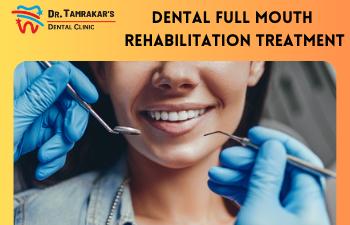Full mouth rehabilitation, also known as full mouth reconstruction or full mouth restoration, is a comprehensive dental treatment approach that aims to restore the health, functionality, and aesthetics of a patient's entire mouth. It involves a combination of restorative, cosmetic, and neuromuscular dentistry techniques to address various dental issues and achieve a harmonious and balanced smile. The need for full mouth rehabilitation may arise due to several reasons, including: Extensive tooth loss: When a patient has lost multiple teeth, either due to decay, trauma, or extraction, full mouth rehabilitation can replace the missing teeth with dental implants, bridges, or dentures. Severe tooth decay: Extensive decay and cavities in multiple teeth may require comprehensive treatment, such as dental fillings, root canal therapy, or dental crowns, to restore their function and prevent further damage. Tooth wear: Excessive tooth wear can result from factors like teeth grinding (bruxism), acid erosion, or a misaligned bite. Full mouth rehabilitation can involve procedures to restore the worn-down teeth, correct the bite alignment, and protect the teeth from further damage. Jaw joint disorders (TMJ disorders): Temporomandibular joint (TMJ) disorders can cause jaw pain, headaches, and difficulty in chewing. Full mouth rehabilitation can incorporate treatments to address these issues, such as occlusal splints, orthodontics, or bite adjustments. Aesthetics and cosmetic concerns: Full mouth rehabilitation can also focus on improving the appearance of the smile. It may involve procedures like dental veneers, teeth whitening, gum contouring, or orthodontics to enhance the overall esthetics of the teeth and gums. The process of full mouth rehabilitation typically involves a thorough evaluation and treatment planning by a skilled dentist or a team of dental specialists. This may include digital imaging, X-rays, models of the teeth, and other diagnostic tools to assess the condition of the teeth, gums, and jaw. Based on the individual's specific needs, a customized treatment plan is created, outlining the sequence of procedures and the expected outcome. The treatment may span several appointments and can involve a combination of various dental treatments, such as dental implants, crowns, bridges, orthodontics, periodontal therapy, and more. Full mouth rehabilitation can significantly improve oral health, function, and appearance, enhancing the overall quality of life for individuals with complex dental problems. It is essential to consult with a qualified dentist or prosthodontist to determine if full mouth rehabilitation is suitable for your specific needs and to receive appropriate care.


